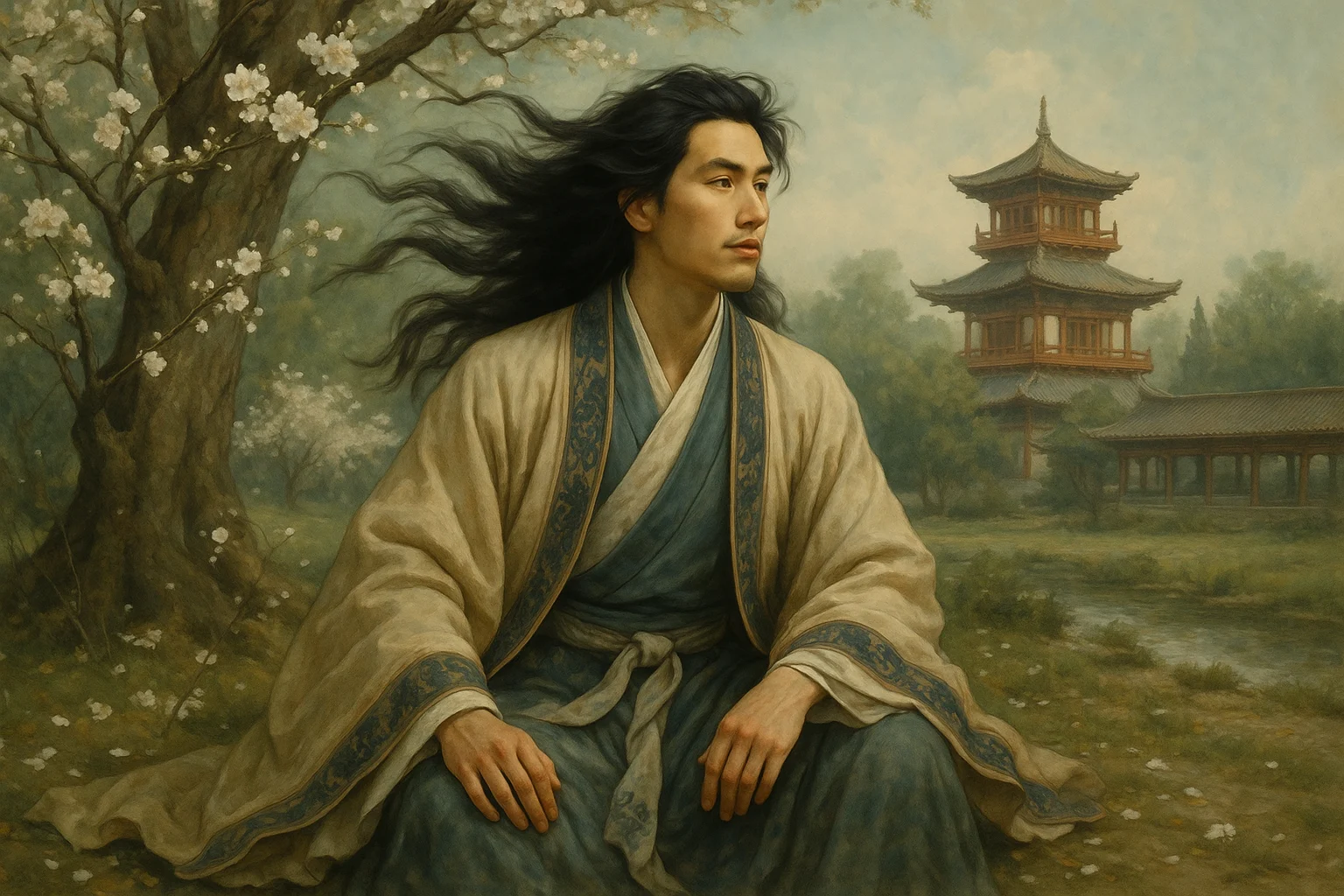With emerald sails and cassia-oared grace,
You’ll trace long rivers past each mountain’s face.
A thousand leagues, your household drifts from spring,
One magistrate’s barge bears east its king.
A connoisseur of wine’s refined art,
Yet bold enough to mock street lads’ heart.
When we part, keep our bond bright in view—
Gibbons wail through mists where trees stand blue.
Original Poem
「送齐明府赴东阳」
韩翃
绿丝帆繂桂为樯,过尽淮山楚水长。
万里移家背春谷,一官行府向东阳。
风流好爱杯中物,豪荡仍欺陌上郎。
别后心期如在眼,猿声烟色树苍苍。
Interpretation
This poem was composed by Han Hong upon bidding farewell to his friend Magistrate Qi, who was departing to assume office in Dongyang. Located in the Jiangnan region, Dongyang was renowned for its picturesque landscapes and prosperity. Through depicting his friend's journey and their shared emotions, the poet expresses both heartfelt wishes for his future career and the reluctance of parting. The poem interweaves scenic beauty with personal charm, blending heroic spirit with tender sentiment, exemplifying the refined depth characteristic of Tang literati's farewell poetry.
First Couplet: "绿丝帆繂桂为樯,过尽淮山楚水长。"
Lǜ sī fān lǜ guì wéi qiáng, guò jìn Huái shān Chǔ shuǐ cháng.
With emerald-silk sails and cassia-wood mast,
He traverses endless Huai peaks and Chu's long rivers.
The couplet opens with opulent details, painting a vivid scene of the journey. The green silk sails and fragrant cassia mast not only suggest the vessel's elegance but also hint at the traveler's distinguished status. "Huai peaks and Chu's rivers"—interwoven mountains and waterways of Jiangnan—are rendered through "traverses endless," conveying both the voyage's arduousness and the lingering attachment of farewell. The imagery balances grandeur with melancholy, setting a tone both majestic and wistful.
Second Couplet: "万里移家背春谷,一官行府向东阳。"
Wàn lǐ yí jiā bèi chūn gǔ, yī guān xíng fǔ xiàng Dōngyáng.
His household moves ten thousand miles from springtime valleys,
One official post now leads him east to Dongyang.
The focus shifts from the journey to the traveler's fate. Relocating his entire family underscores the assignment's permanence and the weight of duty. "From springtime valleys" (背春谷) poignantly contrasts the warmth of home with the unknown ahead, the word "spring" evoking both seasonal beauty and the comforts of familiar life. The parallel structure heightens the emotional tension between duty and longing.
Third Couplet: "风流好爱杯中物,豪荡仍欺陌上郎。"
Fēngliú hào ài bēi zhōng wù, háodàng réng qī mò shàng láng.
Gallant, he delights in the cup's amber depths;
Unbridled, he outshines the cockiest street youths.
Here the poem captures the friend's vibrant personality. "Gallant" (风流) and "unbridled" (豪荡) sketch a figure of spirited independence, while "the cup's amber depths" (杯中物) celebrates his zest for wine and life. The playful claim that he "outshines the cockiest street youths" (欺陌上郎) blends admiration with affectionate teasing, revealing their camaraderie through lighthearted hyperbole.
Fourth Couplet: "别后心期如在眼,猿声烟色树苍苍。"
Bié hòu xīn qī rú zài yǎn, yuán shēng yān sè shù cāngcāng.
After parting, his presence lingers before my eyes—
Gibbons call through mist-veiled, evergreen woods.
The finale elevates emotion through classic farewell motifs. "His presence lingers before my eyes" (心期如在眼) transforms absence into vivid memory, more immediate than mere recollection. The "gibbons' cries," "hazy tints," and "endless verdure" conjure the misty riverlands of Chu, their melancholic beauty mirroring the poet's lingering attachment. Scene and sentiment merge perfectly, leaving the reader immersed in the poem's resonant silence.
Holistic Appreciation
This farewell poem masterfully captures both the picturesque scenery along the journey and the complex emotions surrounding the traveler's departure - his heroic demeanor and the weight of official relocation. The opening couplet "green silk sails with cassia-wood masts" paints a scene of resplendent colors and refined elegance, conveying the grandeur of the voyage. The second couplet speaks of leaving one's homeland, highlighting the inevitable changes and responsibilities of life. The third couplet vividly portrays the traveler's romantic spirit and heroic bearing, embodying the noble character of a scholar-official. The final couplet uses the imagery of gibbon cries and misty trees to express profound longing after separation, creating a subtle yet far-reaching emotional resonance. The poem presents a magnificent yet profound artistic conception where scene and emotion perfectly merge, exemplifying Han Hong's signature style of "rich poetic inspiration where every verse sings."
Artistic Merits
Han Hong's poem demonstrates rigorous structure and elegant diction, skillfully employing vivid natural imagery contrasted with human demeanor to enhance the complex emotions of parting. Details like "green silk sails" and "cassia-wood masts" enrich the visual quality, reflecting Tang literati's aesthetic appreciation of objects. The parallel couplets are perfectly balanced with smooth phrasing and lively rhythm. The traveler's character emerges vividly, presenting a unified contradiction of scholarly unrestraint and tender sensitivity. The overall style remains fresh and graceful with enduring charm.
Insights
This farewell poem teaches us to maintain our grace and heroic spirit when facing life's changes, while cherishing true friendship. No matter how far the journey, heartfelt concern endures, as expressed in the line "after parting, the heart's longing remains before the eyes." The poem also reflects ancient literati's love of natural scenery and their artistic technique of expressing emotion through landscape, reminding us to cultivate an eye for beauty in daily life and face life's meetings and partings with genuine emotion. It shows how traditional Chinese poetry transforms personal experience into universal truth through exquisite imagery and profound emotional resonance.
About the Poet

Han Hong(韩翃), a native of Nanyang, Henan, was one of the "Ten Literary Masters of the Dali era" (大历十才子). He was renowned for his poetry, particularly farewell and parting verses, which gained significant acclaim during his time. The Complete Tang Poems (《全唐诗》) preserves three volumes of his works.











